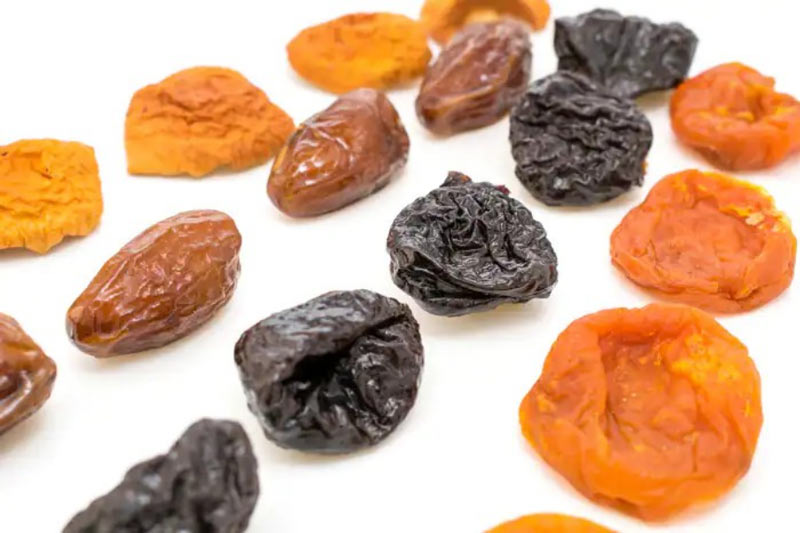Who would have thought that something as simple and unassuming as a prune could have such powerful health benefits? Prunes are an excellent source of nutrition and taste, providing the perfect balance between natural sweetness and wholesomeness.
Rich in fiber, minerals, antioxidants, and even certain vitamins, studies show that regular prune consumption can help improve your digestion, lower cholesterol levels, aid bone health, and even reduce the risk of cancer. Ready to learn why adding prunes to your daily routine benefits your well-being? Read on.
What are Prunes and their Nutritional Benefits
Prunes are dried plums that have been around for centuries. They provide many essential vitamins and minerals and offer many health benefits. Prunes are high in fiber, potassium, vitamin K, and iron. They contain antioxidants that can help protect against oxidative stress-induced damage to cells in the body. Studies have shown that prunes can help improve gut health, aid in weight management, boost bone strength and reduce the risk of certain chronic diseases.
Fiber is one of the primary benefits of prunes. Fiber helps regulate digestion and can help keep you fuller for longer. Prunes have a high content of soluble and insoluble fibers, which are important for maintaining regularity and gut health.
Potassium is a crucial mineral that helps control fluid balance and blood pressure. Prunes have more potassium than bananas or oranges, making them one of the greatest providers of the mineral.
By facilitating calcium absorption, prunes' high vitamin K content can aid to support bone health and lower the risk of osteoporosis. Prunes also contain a sizable amount of iron, which is necessary for the creation of energy and red blood cells.
Antioxidants protect the body from oxidative damage caused by free radicals. Prunes contain various antioxidants, including catechins, procyanidins, and phenolic acids, which can reduce inflammation.
Combining fiber, vitamins, minerals, and antioxidants makes prunes a superfood for good health. They are easy to incorporate into your diet as snacks or added to oatmeal or yogurt. Prunes offer many great benefits for your overall health and well-being.
How Prunes Aid in Digestion

Prunes are a great source of dietary fiber, with one cup providing an impressive 12.6 grams. Dietary fiber can help improve digestion by slowing down the rate at which food is absorbed and helps to keep you regular. Prunes also contain certain compounds linked to improved gut health, such as polyphenols and sorbitol, which can help reduce inflammation in the digestive tract and have a laxative effect.
Prunes are also packed with vitamins and minerals, including vitamins A and B vitamins, potassium, magnesium, zinc, and iron. All these nutrients aid digestion by helping to balance stomach acid levels to keep indigestion at bay.
Furthermore, prunes can help balance healthy gut bacteria, contributing to better nutrient absorption and overall digestive wellness.
Try adding some prunes to your diet to get your daily intake of dietary fiber and essential vitamins and minerals. Whether as a snack or part of a meal, prunes are a tasty way to keep your digestive system healthy and balanced.
By including more prunes in your diet, you can enjoy all their nutritional benefits while improving digestion, gut health, and nutrient absorption. Prunes are a great addition to any meal plan and an easy way to get the essential vitamins and minerals our bodies need daily.
Heart Health Benefits of Eating Prunes
Prunes have been linked to improved heart health in numerous studies. They are packed with antioxidants, dietary fiber, and other nutrients that can help promote heart health. Eating prunes has been found to reduce LDL (bad) cholesterol, increase HDL (good) cholesterol, and even decrease the risk of coronary artery disease.
Prunes also contain plant sterols, which have been found to reduce inflammation and cholesterol levels. Lastly, prunes are a good source of potassium, which helps to maintain healthy blood pressure levels. With all these benefits combined, eating prunes is an excellent way to promote overall heart health.
The Role of Prunes in Weight Loss
Prunes are a rich source of dietary fiber, which is linked to weight loss. Studies have shown that increasing dietary fiber intake can help reduce body weight and waist circumference.
Prunes are also low in calories and contain naturally-occurring sugars, such as sucrose and fructose, along with trace amounts of glucose. This combination of fiber, low calories, and naturally occurring sugars make prunes an excellent choice for people trying to lose weight.
In addition to the benefits of dietary fiber, prunes are also a good source of potassium.
Potassium is an electrolyte that helps maintain normal water balance in cells and blood vessels and regulates muscle contractions and nerve impulses. Increasing potassium intake can reduce water weight, often a factor in feeling bloated or having excess body fat.
The combination of beneficial nutrients in prunes makes them an excellent choice for people trying to lose weight. They provide dietary fiber and potassium, two essential components that help promote healthy weight loss. Prunes should be included in any weight loss plan to boost overall nutrition and support sustainable healthy weight reduction.
Different Ways to Enjoy Prunes

Prunes are a delicious and nutritious addition to any meal or snack. They have plenty of fiber, vitamins, and minerals and provide a unique and satisfying sweetness that makes them an ideal ingredient in countless recipes. From sweet treats to savory dishes, there are many ways to enjoy prunes.
One way to enjoy prunes is in baked goods. Whether you’re making a classic dessert like a cobbler or something more modern like cupcakes, adding some chopped prunes will add an extra layer of flavor and texture. Prunes can also be used in oatmeal, muffins, cookies, and even breads for a unique and flavorful addition.
Prunes can also be used to make savory dishes. Dried prunes are often included in classic recipes like stews and tagines, giving them a delicious sweetness and depth of flavor. Add diced prunes to salads, pilafs, or rice dishes for added texture and flavor.
Finally, prunes can be enjoyed on their own as a healthy snack. Whether you like them dried or soaked overnight in water to soften, prunes are the perfect anytime snack to help you stay full until your next meal.
FAQs
How many prunes should you eat a day?
The recommended daily intake of prunes is 1-2 ounces (about 6-12 prunes). When snacking on prunes, it’s important to remember that they are a source of calories, so enjoy them in moderation.
Are prunes good for constipation?
Yes, prunes are a natural remedy for constipation. Their high fiber content helps promote regularity, while their natural sweetness and soft texture make them easy to enjoy. Prunes are often included in dietary recommendations for people suffering from constipation due to their effectiveness as a laxative.
Are prunes healthy?
Yes, prunes are incredibly healthy. They contain various vitamins, minerals, dietary fiber, and naturally occurring sugars. Prunes are also low in calories, making them an excellent choice for people trying to lose weight. Their combination of beneficial nutrients makes them an ideal food for promoting overall health and wellness.
Conclusion
Prunes may be small, but they pack a powerful punch. Full of minerals, vitamins, and antioxidants, they can provide a range of health benefits, such as improving digestion, lowering cholesterol levels, aiding bone health, and even reducing cancer risk—which is why we consider them an excellent source of nutrition.




